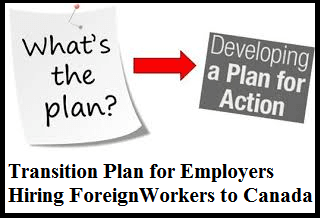Transition Plan for Employers Hiring Foreign Worker
Hiring Foreign Workers and Transition Plan for Employers
A Transition Plan is a mandatory document required by a majority of employers in Canada when applying for a Labour Market Impact Assessment (LMIA). The transition plan is to make sure that business that require Temporary Foreign Workers have an efficient plan to switch to a Canadian workforce should the need arise and mostly applies to foreign workers employed in a high wage position.
What is a Labour Market Impact Assessment?
An LMIA is a document that the Canadian employer needs to be able to hire a foreign worker to Canada. In order for the employer to be eligible to hire a foreign worker he/she needs to demonstrate recruitment efforts to Service Canada that he/she attempted to hire Canadian citizen or Permanent Resident. Recruitment efforts can be shown through different advertising and posting methods (posting on different website, offering higher wage etc.) If Service Canada is satisfied with the recruitment efforts he/she will issue a Positive LMIA to the employer. The Positive LMIA shows that there is a need for a Foreign Worker to fill that job and that there is no Canadian worker to available to do that job. A Positive LMIA is also known as a confirmation letter. Once the employer receives the confirmation letter the foreign worker can apply for the Work Permit. The foreign worker needs to submit the confirmation letter, the job offer letter, the employment contract along with its work permit application.
Offering Low wage v. High wage for Temporary Foreign Workers
The Temporary Foreign Worker Program uses wages instead of a concrete classification codes system as wages give a more reliable data about the employment demographics of a region. Temporary foreign workers being paid below the provincial median are considered low-wage and those being paid at or above the provincial median are considered to be high-wage workers. Such as, the median hourly wage in Ontario is $22.00/hour. A person such as a food court attendant or sales associate will earn less than $22.00/hour and be classified a low-wage worker. A person who is in a managerial position is likely to earn above $22.00/hour; he or she will be classified as a high-wage worker.
Employment and Social Development Canada can refuse LMIA applications in certain cases such as in areas of high unemployment.
| Province | Area | Unemployment rate |
| Nova Scotia | Cape Breton | 15.0 |
| Nova Scotia | Halifax | 6.3 |
An LMIA application for foreign employment in Cape Breton, Nova Scotia, is likely to be rejected. While an LMIA application for Halifax, Nova Scotia, has a higher chance of success.
What is a Transition Plan?
A Transition Plan is a “detailed roadmap” which outlines at least 5 activities an employer will undertake for the duration of the LMIA or work permit(s) to ensure an efficient switch to a substantial Canadian workforce.
Transition Plans hold employers accountable for their promises on the Labour Marker Impact Assessment.
Employers who wish to hire Temporary Foreign Workers as high wage employees must also submit a transition plan, which acts as an extension to the recruitment and advertising requirements, along with the LMIA. A transition plan ensures employers do not get overly reliable on foreign workers. Transition plans are put in place to ensure Canadian citizens and permanent residents are given the first chance along with under-represented groups such as new immigrants, aboriginal people, youth, and Canadians with disabilities. This way employers are encouraged to provide in-skill training to Canadians such as taking in students, interns, and apprentices. Employers must also report on the success of their transition plan and results of the plan if the employer was selected for an inspection.
By making it much more difficult to obtain foreign workers than Canadian workers, it is expected the dependency on foreign workers will decrease.
Approach to Transition Plans
Approach Method 1:
The first approach method requires employer to fulfil 4 of the activities outlines in the Transition Plan. The first three activities must be substantially different from the minimum requirements that were listed with the job posting. This is to attract a larger, and if possible, different group of interested candidates. Activity 4 requires employers to target groups that are under-represented within the region.
Approach Method 2:
This method is the preferred method for most employers but also carries the most risk. The second approach method recognizes that employers will only accept temporary foreign workers who will become permanent residents of Canada. However, should the employee wish to turn down the permanent residency; the employer could be charged with non-compliance.
Hiring a Foreign Worker to Canada? Contact Akrami & Associates
Transition Plans are required by all employers employing Temporary Foreign Workers in high wage positions (above the median hourly wage) to detail a 5 step plan on how they will decrease their reliability on a non-Canadian workforce.
If you are hiring a Foreign Worker to Canada and need assistance with the Transition Plan then contact Akrami & Associates. Akrami & Associates has submitted many successful LMIA applications and we can help you too.
With Akrami & Associates there is always a way!!
Latest Immigrations News

December 5, 2025
THE ULTIMATE GUIDE TO HUMANITARIAN & COMPASSIONATE (H&C) APPLICATIONS IN CANADA
THE ULTIMATE GUIDE TO HUMANITARIAN & COMPASSIONATE (H&C) APPLICATIONS IN CANADA Understanding When, Why, and How to Apply for Permanent Residence on Humanitarian Grounds What Is an H&C Application? A Humanitarian and Compassionate (H&C) application is a last-resort pathway for individuals who are in Canada and do not [...]

September 11, 2025
Canada Super Visa: Step-by-Step Guide for Parents and Grandparents
For many Canadian citizens and permanent residents, bringing parents or grandparents to Canada for extended visits is more than just a wish, it’s a heartfelt need. While most people first consider the traditional visitor visa, there is another option designed specifically for family reunification: Super Visa applications. [...]

August 23, 2025
Intra-Company Transfer (ICT) Work Permit, Your Complete Guide to Working in Canada
For multinational companies, moving key talent across borders is often essential for growth and operational success. The Intra-Company Transfer (ICT) Work Permit provides a streamlined pathway to bring experienced employees to Canada without the time-consuming Labour Market Impact Assessment (LMIA) process. For foreign professionals, it’s more than [...]

Book a Conslutation
One of our Representatives will
assist you with your matter. Book Now!
Click here

Call us for
more Information
+1-416-477-2545
Toll Free: 1-877-820-7121
Click here

Write Us (Online Form)
Complete our form and one of our
Representatives will contact you.
Click here
Subscribe To Our Newsletter





